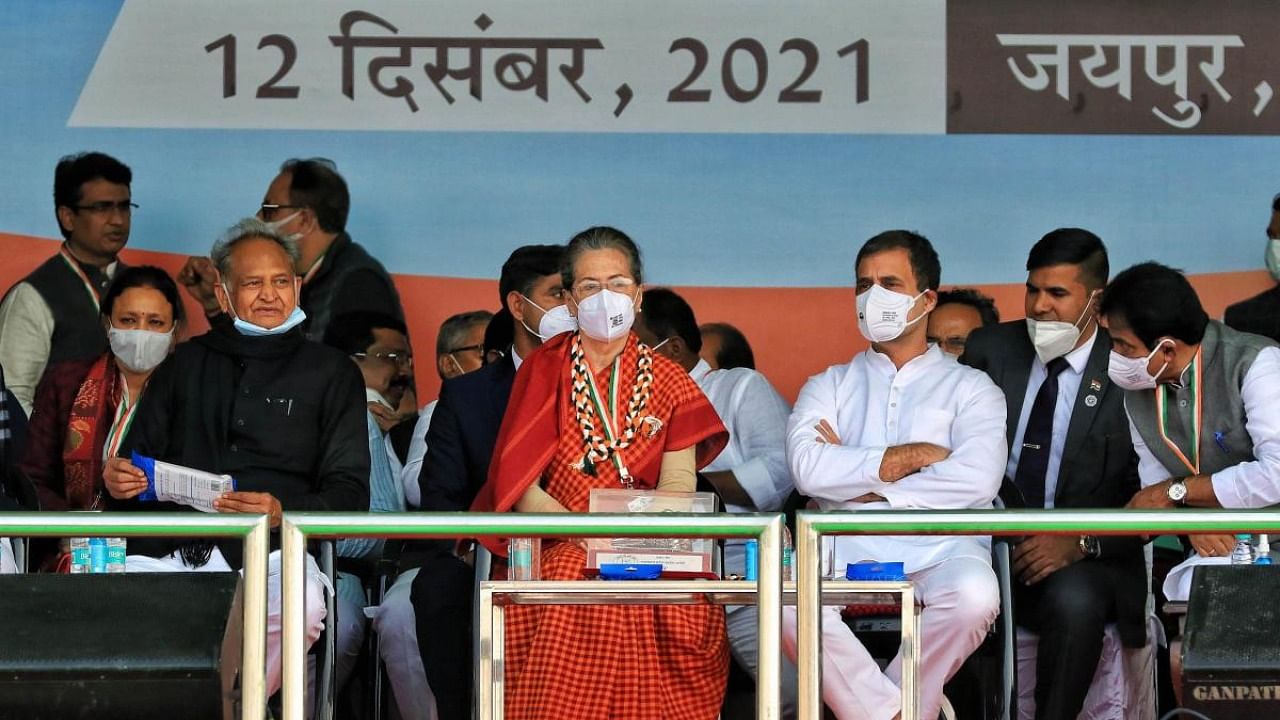
Price rise and the steep inflationary trend are issues that the reluctant and divided opposition should have focused on with full might to corner the Narendra Modi government. Notwithstanding the multiple divisions in the Opposition camp ahead of the forthcoming Assembly elections, the Congress held a massive national rally in Jaipur on December 12. The event was significant enough for the party that Congress president Sonia Gandhi travelled to Jaipur to enthuse the party rank and file despite her ill-health. However, she did not address the rally. It was a sign that the Congress is in a do-or-die situation with regional satraps, such as the Trinamool Congress chief, Mamata Banerjee, challenging the grand old party's credentials to become the fulcrum of opposition unity.
Political rallies and meetings are organised not merely as a mark of protest or eulogy for a particular development if the organisers happen to be the ruling party. Such events are also a show of strength or to send a message to the rank and file and the people about the prevailing political situation. Some interpreted the anti-price rise rally to be an attempt to re-lay the platform for anointing Rahul Gandhi as the party chief or establish his supremacy within the party. But that did not seem to be the case or the only cause. The national rally on the issue of price rise is a natural culmination of the Congress's several protests against rising prices, particularly of petrol and diesel. The change of venue from Delhi to Jaipur was necessitated after Delhi Police refused permission to allow the event in the national capital.
While price rise was the central theme of the Jaipur rally, Rahul Gandhi criticised Prime Minister Modi and the ruling Bharatiya Janata Party (BJP) on the issue of Hindutva, distinguishing it from Hinduism. Precisely a month after he had raised this issue of the distinction between Hindutva and Hinduism for the first time while addressing a Congress training programme at Wardha, he chose Jaipur to take this debate further. The idea ostensibly was to sensitise party leaders and workers assembled from across the country about the issue. As the Wardha address was limited to a small gathering, a public rally of this magnitude certainly was a chance for him to broaden the canvas of his Hindutva versus Hinduism debate.
Primarily, there were two main messages that the party wished to convey from the platform of the price-rise rally apart from highlighting inflation. Firstly, it attempts to corner the ruling party, particularly the PM, on the issues of "misgovernance" such as price rise and national security. Secondly, it will challenge the ruling party head-on on ideological matters. Both - price rise and Hinduism versus Hindutva debate - were evident in the Jaipur rally, and more on this is expected in the days to come.
Some quarters within the Congress had expressed reservations when Rahul Gandhi touched upon the Hinduism versus Hindutva debate during his address to the AICC training camp in Wardha. But there are substantial sections within the Congress and outside who feel that the party must take a clear stand on the issue, particularly on Hindutva, the BJP's political plank. Rahul Gandhi's shaping of the debate suggested that the Congress is preparing for a slugfest and challenge the ruling dispensation's purported hegemony to depict itself as guardian of a particular religious group.
The old-timers in the Congress who believe that silence is golden on this and that the storm would blow over on its own are becoming outdated in the party and losing strength. In this era of optics, there is no scope for ambiguity, let alone silence. The party would be required to strategically frame its stand on critical ideological and political issues that the ruling BJP successfully exploits. That silence is golden, but it has its pitfalls when the political rival happens to be Modi backed by well-oiled organisational machinery. The silence in such a case could be misconstrued as weakness, a projection successfully done by the BJP strategists. Or else it could also reflect concurrence. Luckily for the Congress, the concurrence would not stand ground given the direct ideological fight which the party has with the outright religion-based politics of the BJP.
The second and equally important motivation behind this rally was to use the occasion to show strength and portray inner-party unity, a big trouble spot lately for the Congress high-command. The latest challenge is from the rebelling Group 23, or G23, leaders. The G23 has considerably decimated, but the party's top brass seized this opportunity to publicly display a semblance of unity. Accordingly, most rebel leaders owing allegiance to this group, including G23 leader Ghulam Nabi Azad, were invited to the rally.
Some of the frontline leaders of the rebelling group, such as former Haryana chief minister Bhupinder Singh Hooda and the party's deputy leader in Rajya Sabha, Anand Sharma, shared the dais with the Gandhis against whom they had raised questions. However, Azad did not attend the rally for unknown reasons.
(The writer is a senior journalist)
Disclaimer: The views expressed above are the author's own. They do not necessarily reflect the views of DH.
Check out DH's latest videos: